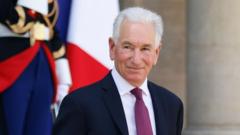Kushner, a Jewish figure with familial ties to former President Donald Trump, stated that there has been a disturbing increase in antisemitic acts across France since the onset of the Gaza war. He detailed his observations in a letter urging Macron to lessen his criticisms of Israel, pointing to a distressing landscape where Jews face daily assaults, vandalism, and threats. France’s foreign ministry characterized Kushner’s comments as "unacceptable" and asserted that ambassadors must refrain from interfering in the internal matters of sovereign nations, citing the Vienna Convention of 1961.
This diplomatic rift also highlights a broader context wherein Macron has called for international recognition of a Palestinian state, a move that has ruffled feathers within Israel. Macron emphasizes that the future of Palestine should not undermine Israel’s security but should instead be integrated into a peace solution for the Middle East. His government has prioritized countering antisemitism in France, having increased security measures for Jewish institutions amidst rising tensions related to the conflict.
The violence in Gaza, triggered by a Hamas attack on Israel on October 7, 2023, has dramatically escalated, with staggering casualty figures reported on both sides. Recent assessments also indicate dire humanitarian conditions in Gaza, with claims of widespread famine emerging. Amidst these developments, both Kushner's remarks and France's diplomatic response illuminate the complexities and sensitivities intertwined in international politics regarding the Israeli-Palestinian conflict.
The tensions between France and the United States, particularly in the context of the Middle East crisis, underscore the delicate nature of diplomatic relations while also amplifying the urgent conversations surrounding antisemitism and security in France.
This diplomatic rift also highlights a broader context wherein Macron has called for international recognition of a Palestinian state, a move that has ruffled feathers within Israel. Macron emphasizes that the future of Palestine should not undermine Israel’s security but should instead be integrated into a peace solution for the Middle East. His government has prioritized countering antisemitism in France, having increased security measures for Jewish institutions amidst rising tensions related to the conflict.
The violence in Gaza, triggered by a Hamas attack on Israel on October 7, 2023, has dramatically escalated, with staggering casualty figures reported on both sides. Recent assessments also indicate dire humanitarian conditions in Gaza, with claims of widespread famine emerging. Amidst these developments, both Kushner's remarks and France's diplomatic response illuminate the complexities and sensitivities intertwined in international politics regarding the Israeli-Palestinian conflict.
The tensions between France and the United States, particularly in the context of the Middle East crisis, underscore the delicate nature of diplomatic relations while also amplifying the urgent conversations surrounding antisemitism and security in France.



















